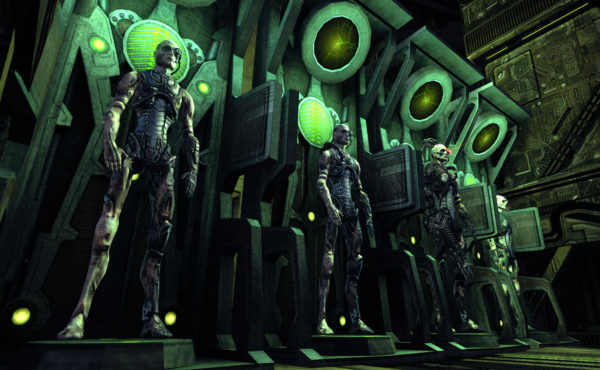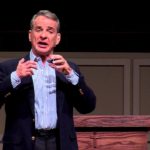Sympathy for the Borg
by Matthew Allen Newland
Filed under Anthropology, Movies/TV
The idea of the mystical body of Christ has always been one of great interest to me, as there was always something about it at odds with the mentality in which I was raised: "Be yourself", etc. was (and remains) the mantra of the day, and the whole idea of being but a single part of something larger did not always sit well. I remember being a ten-year-old watching as the Borg stripped Captain Picard of his identity and "assimilated" him into their collective (his pronoun "I" replaced with "we").1 And of course the Borg were an enemy to be resisted.
Years later, I recall reading Ayn Rand's Anthem (1938) and slowly realizing that the "we" narrating the story was really a single individual, living in a dystopian future scrubbed of the concept of "I" and living under the control of an oppressive, collectivist society. Examples like these would color my view of Plato's Republic the first time I encountered it, as I began my career as a philosophy student, but I've since learned to enjoy Rand's book as an interesting science fiction tale. Not regarding it as quality philosophy, I have instead placed it on the shelf with other, similar works like Aldous Huxley's Brave New World (1931) and Kurt Vonnegut's Player Piano (1952).
Plato's Republic shows us a society (Plato's idea of a perfect one, in fact) where the individual is not considered to be self-sufficient, but a vital part of her or his community, with a role to play as a tradesman, worker, or soldier/guardian. Plato imagines people not as individuals in their own right, but as components in something larger: In Book II of the Republic, Plato tells us that individual humans are the same kinds of things as cities. Human bodies are a collection of living parts (cells, organs, and systems) that work together to accomplish a goal (a successful, healthy life).2 Cities, meanwhile, are collections of living parts as well (individual people, families, and institutions). Cities are made of different organizations: schools, energy providers, waste disposal services, businesses providing food and clothing, etc. If you think about it, the human body has systems that perform similar tasks for itself ... and all these systems working together properly give rise to a healthy human being. Plato's argument, therefore, centers on the idea that society comes before the individual.
The individual too, in Plato's view, may be regarded as a kind of collective (a miniature city, according to his analogy), a composite soul made up of cooperating parts. These parts, like people, find themselves at odds and in pursuit, at times, of conflicting goals; Plato sees such internal disagreement as the explanation of temptation.3
Plato's words certainly resonated with me, especially when it was pointed out to me that this was actually quite similar to what St. Paul described when he said of the Church: "For in the one Spirit we were all baptized into one body—Jews or Greeks, slaves or free—and we were all made to drink of one Spirit. Indeed, the body does not consist of one member but of many" (1 Cor 12:13-14).
This is the mystical body of the Church, which is the mystical body of Christ. The members of the Church act not on their own, but as parts of a larger organism, directed by Christ as their head, and each individual serving a specific role in the service of the whole. As St. Paul explains, "there are varieties of services, but the same Lord; 6 and there are varieties of activities, but it is the same God who activates all of them in everyone" (1 Cor 12:4-6).
In this view, being a part of a collective and effectively losing one's self to relations with and service for others who also lose themselves is not necessarily an idea to be resisted. Either that, or the collective communities as individuals described by Plato and Paul are dressing the bland reality of Borg life in a more attractive package (something that sounds lovely, but is ultimately the same soul-killing system Ayn Rand imagined in Anthem).
The question, then, is whether we can find reason to accept the Platonic/Pauline ideas of individual life-as-community life as reasonable and accurate. If we could try to objectively consider what individual existence is, without any opinions or preferences regarding our statuses as individuals, what would we discover? A look will shed some interesting discoveries. And as I have the benefit of writing on Plato's city-soul analogy for my doctoral thesis, I have done quite a lot of reading on this question already.
One of the most interesting observations I had the pleasure of reading about comes from the Dutch trauma psychiatrist Bessel Van Der Kolk (2014), who observes that our brains are built to help us function as members of a tribe. In fact, he says, “barely exist as individual organisms”.4 This is something we cannot escape, he says, even if we go off on our own and avoid contact with others (Van Der Kolk works with victims of trauma, including victims of childhood abuse who deliberately avoid contact with others in adulthood, as a form of self-protection). He explains: “We are part of that tribe even when we are by ourselves, whether listening to music (that other people created), watching a basketball game on television (our own muscles tensing as the players run and jump) ...”5 Most of our energy is devoted to either connecting with others, or in response to the work, actions, or behaviour of other human beings.
Tragically, those of us who do find ourselves withdrawing from the community of others face unfortunate consequences: "[A]lmost all mental suffering involves either trouble in creating workable and satisfying relationships or difficulties in regulating arousal.”6 In Van Der Kolk's view, the best way to deal with human suffering comes from dealing with how our problems "interfere with our functioning as members of our tribe."7
This unity of experience also has an aspect that ties this idea back to Plato’s Republic. The Dutch philosopher C.A. Van Peursen (1966) describes the “diffuse” existence of the individual (individual existence being secondary to the existence of the community). In and by himself, Van Peursen says, an individual cannot be “cut loose from the social pattern within which alone he comes to be himself.”8 In fact, Van Peursen also observes that the word “I” is not even employed in tribal societies; it is only used in relation to another person: “’I-father’, ‘I-uncle’, and so forth.”9 Individual identity arises from the group, family, or tribe, and one’s relationship with the others.
In conclusion, the idea of being a part of a collective is not necessarily something to be resisted, if properly understood. When St. Paul describes the Church as such, presenting us with a thing so very much at odds with the attitudes of our time, it may be a great stumbling block toward accepting the Kingdom of God. Also, in teaching Plato's Republic many times over the years, my explanation of the city described by Socrates is often greeted with looks of disbelief and silent head shakes. Yet both ideas might be seen as acceptable (even desirable) if we better understand the nature of the neural "machinery" actually working right now within each of our heads, and how our relationships form us into the people we become. By focusing lesson who we are than what we can do for others, we become less selfish and, somehow, both less and more ourselves. Our identity changes as our focus shifts, but our individual role in the service of others flourishes, breeding a new individual identity.
This idea is nicely summed up, in this story adapted from a famous Japanese folktale.
"Contrary to popular belief
the tables of Hell are laden
with the most exquisite dishes of food.
Whatever you could possibly desire:
soups, salads, stews, sauces, curries
if you want, fruits, succulent meats
(grilled to order), pastries, ice cream.
The single unusual factor being that
one must eat with a fork three feet long.
Holding it close to the tines you could manage
to eat, but when you do so, a demon immediately
slaps you (or pokes you with his fork),
and says, "Hold it at the other end!"
So getting the food on the fork up to your mouth
is quite impossible, alas, though an abundance
of delicious food is readily available.
"In heaven the situation is exactly the same:
same long tables covered with tasty dishes,
same long forks.
The only difference in heaven
is that people feed the person sitting across the table from them."10
The lesson of this story is this: if we could become less concerned with our own happiness and more concerned with the happiness of our neighbors, it would be a happier world. Rethinking our place among our fellows is the key. One has only to be assimilated willfully; “Anyone who wants to save his life will lose it; but anyone who loses his life for my sake will find it” (Matthew 16:25).
Related Posts
Notes:
- Piller, M. (Writer), & Bole, C. (Director). (June 18, 1990). "The Best of Both Worlds." [Star Trek: The Next Generation]. G. Roddenberry (Producer). Los Angeles, CA: Paramount. ↩
- The Republic, 369b–372c ↩
- In the Republic, this is illustrated by the story of Leontius (439e–440b). ↩
- Van Der Kolk, B. The Body Keeps the Score: Brain, Mind, and Body in the Healing of Trauma. New York, NY: Penguin Books, 2014. p. 80. ↩
- Van Der Kolk, p. 80. ↩
- Van Der Kolk, p. 81. ↩
- Van Der Kolk, p. 81. ↩
- Van Peursen, C.A. Body Soul Spirit: A Survey of the Body-Mind Problem (English translation with new material by the author). Hoskins, H.H., trans. New York, NY: Oxford University Press, 1966. p. 83. Van Peursen notes that the mourning at an individual’s death may be the result of the disrupted social structure as much as his or her personal loss. ↩
- Van Peursen, p. 83. ↩
- Narayan, Kirin. Storytellers, Saints, and Scoundrels. Philadelphia: Univ of Pennsylvania Press, 1989. p. 197. ↩
Note: Our goal is to cultivate serious and respectful dialogue. While it's OK to disagree—even encouraged!—any snarky, offensive, or off-topic comments will be deleted. Before commenting please read the Commenting Rules and Tips. If you're having trouble commenting, read the Commenting Instructions.













